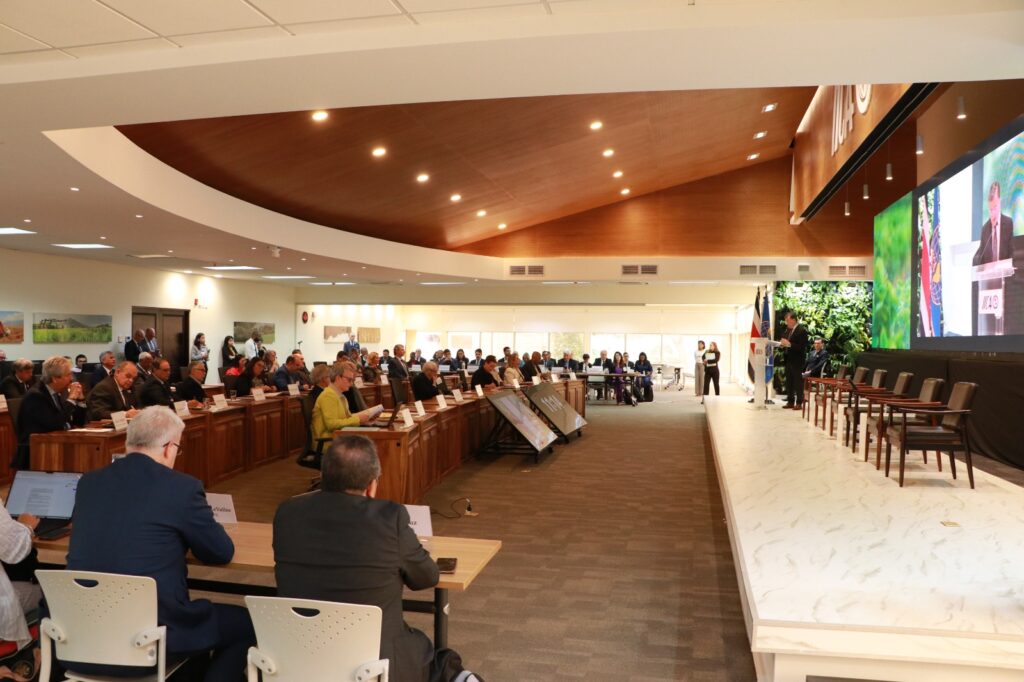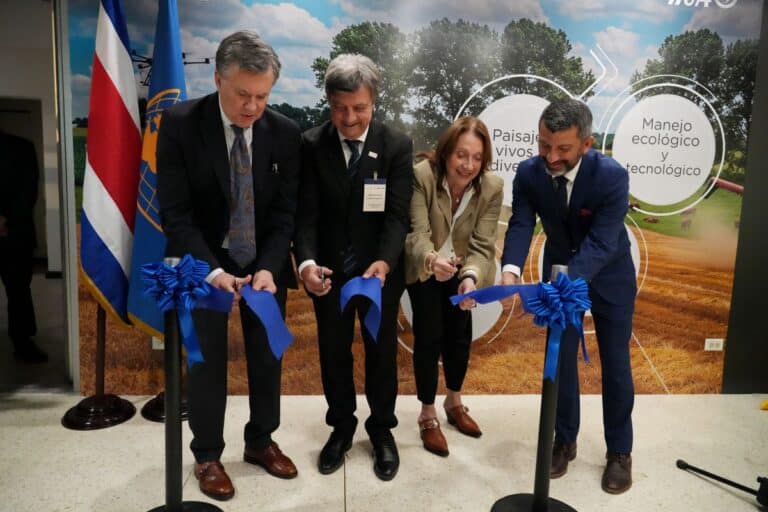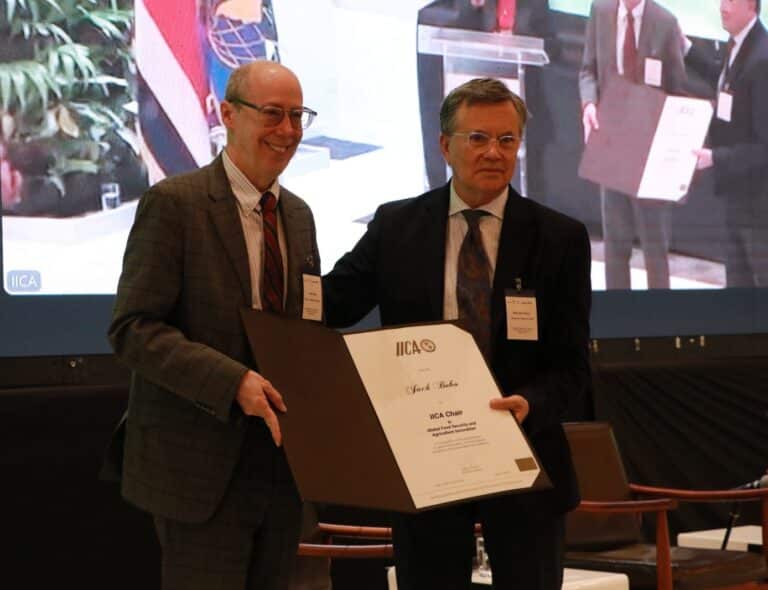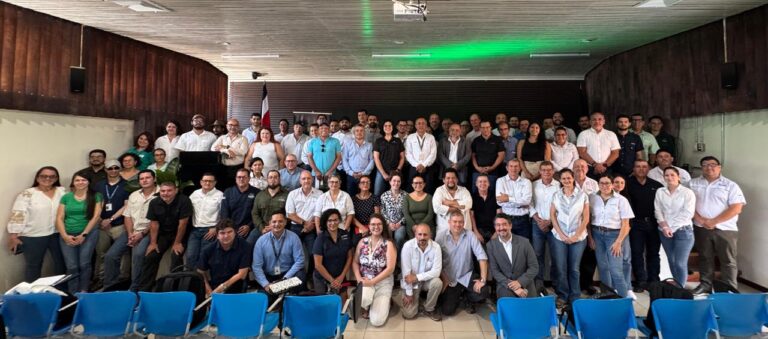
San José, 28 March 2025 (IICA) – The new knowledge frontier will help resolve the tension between the need to increase productivity and the imperative to conserve the environment, as these two objectives will increasingly converge, affirmed representatives of research institutes and officials from international organizations at the Second Regional Dialogue on Science, Technology, and Innovation in Agri-Food Systems of Latin America and the Caribbean.
The headquarters of the Inter-American Institute for Cooperation on Agriculture (IICA) served as the venue for this meeting, a regional debate that is part of ongoing efforts to strengthen and renew FORAGRO, the Forum of the Americas for Agricultural Research and Technological Development.
The event brought together representatives from the science and technology sectors for agriculture and agri-food systems in the region, including national and international research institutes, cooperation agencies, academia, the private sector, and agricultural producer organizations.
IICA serves as the executive secretariat of FORAGRO, which was established in 1997 as a hemispheric, multisectoral mechanism for debate and the mobilization of agreements on research and innovation issues impacting the agri-food sector in the Americas. It has 73 members, including organizations from the public, private, academic, and productive sectors, as well as civil society, among others.
The opening session featured the participation of Silvia Massruhá, President of the Brazilian Agricultural Research Corporation (EMBRAPA); Marion Le Pommellec, Agriculture, Natural Resources, and Rural Development Specialist at the Inter-American Development Bank (IDB); Valeria Piñeiro, Regional Representative for Latin America and the Caribbean at the International Food Policy Research Institute (IFPRI); Manuel Otero, Director General of IICA; and Muhammad Ibrahim, Director of Technical Cooperation at the Institute.

Manuel Otero, Director General of IICA.
Simultaneous transitions
Silvia Massruhá addressed the major challenges facing agriculture due to the need to produce higher-quality food for a growing population and how this context impacts agricultural technology research across the continent.
“We are witnessing several transitions happening simultaneously. We see consumers increasingly concerned about production methods, trade barriers, and the energy transition. We need to leverage more data and information,” said Massruhá, who, in addition to leading EMBRAPA, chairs the Cooperative Program for Agri-Food and Agro-Industrial Technological Development of the Southern Cone (PROCISUR). This institutional instrument facilitates integration and coordination among the national agricultural research institutes of Argentina, Brazil, Chile, Paraguay, and Uruguay, along with IICA.
“We face the challenge,” she added, “of developing a multifunctional, resilient, and sustainable agriculture. With science and technology, Latin America has solutions for complex systems and will continue to be a key player in global agriculture, contributing to food security and peace worldwide.”
“Innovation is about changing for the better,” stated Marion Le Pommellec, who, on behalf of the IDB, stressed the urgency of shifting models.
“We must move toward impact-oriented models focused on adoption and implementation of knowledge—models centered on the end users of technologies,” she asserted. “This means that the institutions involved must change paradigms, consider new tools, and work differently to implement these new models. We are talking about radical changes that will not be easy, but we believe they are essential. We think that rather than just investing more in innovation, we need to invest better, and that is what we are committed to doing at the IDB.”
Piñeiro spoke on behalf of the Consultative Group on International Agricultural Research (CGIAR), the world’s largest network for agricultural research and innovation, as IFPRI is one of its representatives in Latin America and the Caribbean.
“The world is facing interconnected challenges, and our mission is to lead transformative change for the benefit of small-scale farmers, particularly in the Global South,” she explained.
Piñeiro emphasized that technological innovation is a crucial catalyst for agricultural transformation and cannot be achieved without collaboration among all key stakeholders. In this regard, she highlighted that results are already evident in reality: “The dissemination of agricultural technologies has increased food security. Strategic initiatives have successfully transformed the situation of farmers and production. The future of agriculture is marked by continuous evolution.”
New development models
The two-day dialogue at IICA’s headquarters focuses on developing a strategic roadmap for science, technology, and innovation in agriculture and agri-food systems in the Americas. It also aims to advance horizontal cooperation and explore ways to enhance the region’s participation in major global science, technology, and innovation forums for agriculture and agri-food systems.
Muhammad Ibrahim summarized the conclusions from the First Regional Dialogue on Science, Technology, and Innovation, held in May 2023, and provided details on FORAGRO’s work plan for this year. The plan includes designing a regional strategic roadmap for agricultural science and technology and developing a virtual tool to compile knowledge, best practices, and lessons learned.
“This meeting sends a very clear message that agriculture is a strategic pillar for implementing new sustainable development models,” stated Manuel Otero.
The IICA Director General emphasized that the new knowledge frontier presents unprecedented opportunities for Latin America and the Caribbean, such as utilizing agricultural residues to create new bioproducts, restoring ecosystems, and improving water and soil use to combat climate change.
“There has always been tension between increasing productivity and environmental conservation. But thanks to new technologies, these two goals are beginning to converge. We ask ourselves why, despite this new world of technological developments, our region’s agriculture has yet to fully capitalize on them. Or why, despite having institutions focused on agricultural research, we are not making better use of these opportunities. We need a new platform for horizontal cooperation. And we need the Americas to have a stronger voice in the global agri-food technology agenda,” concluded Otero.

Marion Le Pommellec, Agriculture, Natural Resources, and Rural Development Specialist at the Inter-American Development Bank (IDB); Valeria Piñeiro, Regional Representative for Latin America and the Caribbean at the International Food Policy Research Institute (IFPRI); and Silvia Massruhá, President of the Brazilian Agricultural Research Corporation (EMBRAPA).
More information:
Institutional Communication Division.
comunicacion.institucional@iica.int











